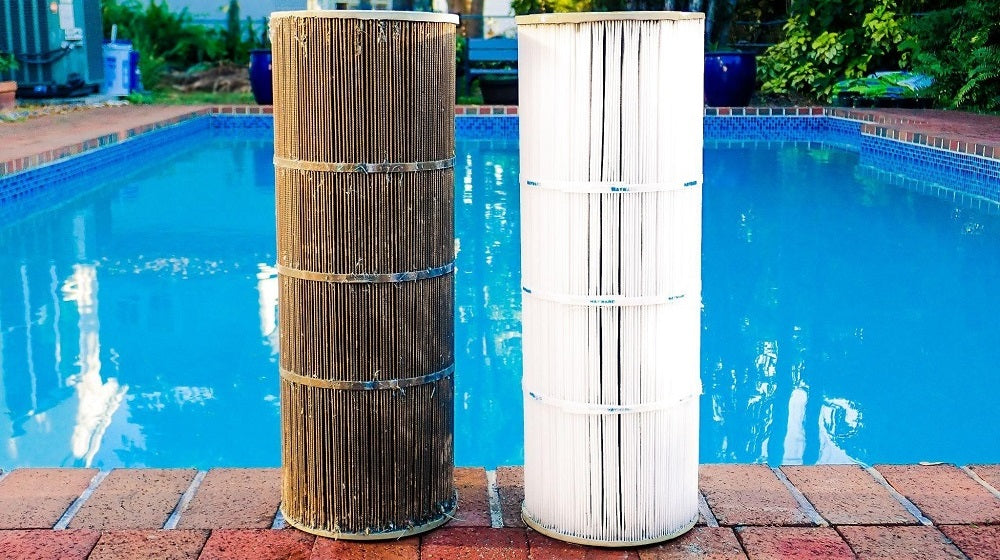Your pool filter works hard to collect debris and filter out harmful elements that can damage the pool pump or make you sick. Yet, when these filters are not cleaned properly or frequently, they can do more harm than good.
Before rushing out to clean your pool filter, check out this detailed, step-by-step guide on the best ways to clean a filter and answers to some of the most commonly asked questions regarding this topic.
Why Clean Your Pool Filter?
Before discussing how to clean a pool filter, let's look at what it is and what it actually does.
A pool filter is a cylindrical object with thin, pleated polyester material folded like an accordion wrapped around the outside. This material is tasked with catching large and small debris like algae, bacteria, leaves, grass, etc., and keeping them from moving toward the pool pump since only water can safely pass through it.
What happens when your filter isn't cleaned? When the filter system isn't clean, the small pores of this pleated material will quickly fill up and get blocked.
This leaves the debris floating around the pool and can even lead to pump issues since it will require additional pressure to circulate the water.
How to Clean a Pool Filter (Step-By-Step)

Now that you know how critical it is to ensure your pool filter is always clean, let us jump right into how to get the job done... the right way.
Step 1: Turn Off the Pump
While many people tend to keep the water moving while cleaning out their filters, it is always best to shut the pump down and open the air release valve first.
You want the air release valve to release air pressure before you open the filter tank, and the pump shouldn't be moving the water because there will be nothing to clean it once the filter is removed. That will mean dirty water is circulating through your pump.
Step 2: Remove the Filter Cartridge
Now that the filter housing is open, take out the pool filter cartridge. Some pools have multiple filter cartridges, and they should all be cleaned simultaneously.
Step 3: Clean the Filter With Water or Air
There are multiple ways to clean a pool filter, but the two most common options are using the garden hose or an air compressor. Remember that these filters are made from a soft material, so leave the pressure on the garden hose or compressor low so you don't damage them.
While holding the filter or placing it on the ground, aim the nozzle at the top and slowly spray it, working your way down until you get to the bottom, then flip it over and do it again. Depending on how filthy the filter is, it might need to be cleaned three or four times.
You will know it is working when you see thick discoloration dripping from the filter onto the ground.
Step 4: Soak It in Solution
Really dirty filters can soak in a cleaning solution. Most people use dish soap or vinegar to create a solution, mixing it with water in a bucket and soaking the filters overnight. This helps to loosen stuck-on debris, making it easier to clean.
While it might seem like a good idea to use bleach or chlorine, this is not advised since it could cause the filter to deteriorate quickly.
Step 5: Replace the Filter in the Housing
Now that your pool filter is clean and ready to return to work, you can put it back into the housing unit. When doing so, close the air vents and secure the lid so the pressure is reinstated and the filtration system runs smoothly.
Now, turn on the pump and ensure everything works as it should.
When to Replace Your Filter
You should replace your filter every 2000 hours of running time or every two years. However, if you have a lot of people in and out of the pool during the summer, you'll probably find yourself replacing them frequently during the season due to grass, sunblock, lotions, hair products, etc.
How to Tell If Your Pool Filter Needs to Be Replaced
You'd be surprised at how many different parts of your pool suffer when the filter fails. Clogged or damaged filters can wreak havoc on your pump and pool water if they aren't maintained.
The most noticeable ways to tell your filter needs cleaned or replaced include:
- Murky water
- Pressure issues
- Valve leaks
- Tank failure
- Valve failure
- Sounds coming from the housing unit
If you notice any of these issues, you will first want to clean your filter and see if the problem resolves.
Other Types of Pool Filters

Many people use a cartridge filter to keep their swimming pool water crisp and clean, yet a few other types of filters can do the same thing.
Sand Filters
Sand filters have large barrel-like tanks that contain fine-grained sand. As the water moves through the sand, it captures the small particles and debris.
When your sand filter needs to be cleaned out, you can purchase a special solution to break down and destroy things such as oils and minerals to keep the sand clean.
Diatomaceous Earth Filters
Diatomaceous earth (DE) filters are less common but still used in some pools, mainly saltwater pools.
Cleaning these filters takes a little more time since the particles themselves tend to break down over time, which means aside from using a cleaning solution, you will often have to refill the filter tank, adding more DE throughout the summer months.
Keeping Pool Filters Clean Will Extend the Life of Your Pool
Regular pool filter cleaning is crucial to keep the water nice and clear and extend the life of your pump and pool.
Following the instructions above, you shouldn't have any issues getting your pool filter back to a quality condition, ensuring the grime that gets into the water doesn't stay there for long.

